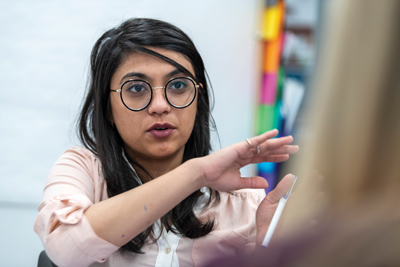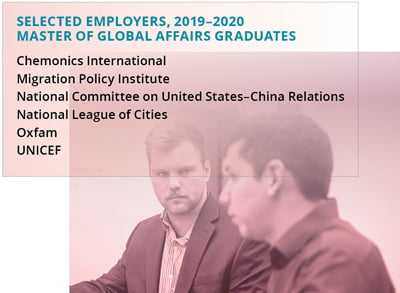2021 In-Demand Careers in International Affairs
THIS GUIDE IS NO LONGER ACTIVE. For the current FP Guide, click here.
University of Notre Dame, Keough School of Global Affairs
Graduates Skilled in Data Analysis, Communication Poised for International Careers
 Working at the United Nations gives one a critical perspective on the international system. Even before the COVID-19 pandemic overran the globe, Paul Winters witnessed how health could be affected by a range of factors—from climate change to wealth inequality and from agriculture to nutrition. This complexity and interconnectivity of today’s global system creates challenges to achieving global objectives, he says, but it also offers new opportunities for graduates of international affairs.
Working at the United Nations gives one a critical perspective on the international system. Even before the COVID-19 pandemic overran the globe, Paul Winters witnessed how health could be affected by a range of factors—from climate change to wealth inequality and from agriculture to nutrition. This complexity and interconnectivity of today’s global system creates challenges to achieving global objectives, he says, but it also offers new opportunities for graduates of international affairs.
“Nearly every aspect of the global development field now integrates technology and data in some way,” Winters says. Now, with an increased availability of data and a focus on gathering and using that information, students who can interpret, visualize, and communicate complex data will be more competitive in the field of international affairs. “The demand for these skills is greater than the number of professionals who have them,” he says.

“The highest-priority skill graduates need is the ability to write on complex issues in a short, concise, and yet engaging manner.” –Paul Winters, Keough-Hesburgh Professor of Global Affairs, Keough School of Global Affairs, University of Notre Dame
Winters recently left his position at the UN’s International Fund for Agricultural Development to join the University of Notre Dame’s Keough School of Global Affairs, where he is the Keough-Hesburgh Professor of Global Affairs and director of the school’s sustainable development concentration in the Master of Global Affairs program.
Educators must respond to several current trends in international development, Winters says. “The highest-priority skill graduates need is the ability to write on complex issues in a short, concise, and yet engaging manner,” he says. “Even with the overwhelming issues facing the world, everyone wants their content to be distilled down to brief or a tweet—something that can be posted on social media or published in policy documents that are no more than five pages.”
 The second-greatest need is the ability to visualize and interpret data. “Because so much of the work in international development and in humanitarian interventions is project-based, there is a need to be able to monitor and assess the impact of a project,” Winters says.
The second-greatest need is the ability to visualize and interpret data. “Because so much of the work in international development and in humanitarian interventions is project-based, there is a need to be able to monitor and assess the impact of a project,” Winters says.
To help students be competitive in international affairs, the Keough School provides “a global curriculum for the 21st century.” This includes courses on quantitative analysis, visualizing data, Information Communications Technology for Development (ICT4D), and policy writing. The school also hosts skills-based policy labs where students get intensive, hands-on experience in topics such as big data, machine learning, and artificial intelligence.
To apply these skills in real time, the school’s Integration Lab partners students with global organizations to solve real-world problems. In doing so, students develop sought-after “soft skills,” such as leadership, design thinking, and problem solving.
Contact
keough.nd.edu/mga
[email protected]
574-631-3426![]()
Contents
- 2021 In-Demand Careers in International Affairs
- Johns Hopkins University School of Advanced International Studies
- University of Denver, Josef Korbel School of International Studies
- Tufts University, The Fletcher School
- University of Kent, Brussels School of International Studies
- Arizona State University, Thunderbird School of Global Management
- George Mason University, Schar School of Policy and Government
- Texas A&M University, The Bush School of Government & Public Service
- University of Pittsburgh, Graduate School of Public and International Affairs
- University of Notre Dame, Keough School of Global Affairs
- Northwestern University